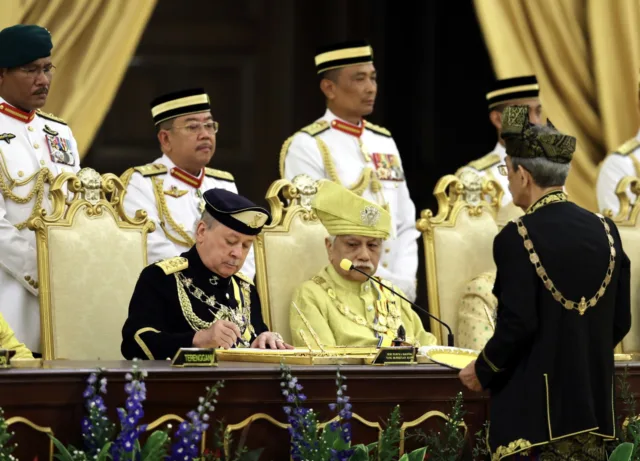In a ceremony steeped in tradition and significance, Sultan Ibrahim Iskandar, the billionaire ruler of Johor state, has officially ascended to the position of Malaysia’s King, or “Yang di-Pertuan Agong,” under the nation’s distinctive rotating monarchy system. The swearing-in ceremony, held at the palace, marked the beginning of Sultan Ibrahim’s five-year term at the helm of Malaysia’s monarchy on 31st January, 2024. On the solemn occasion, Sultan Ibrahim, aged 65, undertook the oath of office, a moment witnessed by esteemed dignitaries including representatives from other royal families, Prime Minister Anwar Ibrahim, and members of the cabinet. While the formal coronation is set to follow at a later date, the swearing-in ceremony symbolized the commencement of Sultan Ibrahim’s reign.
Under Malaysia’s unique system, the heads of the country’s nine royal families alternate as the King every five years, ensuring a diverse representation of the nation’s royal lineage in the highest office of the land. Renowned for his vast collection of luxury automobiles and substantial business ventures spanning real estate and mining, Sultan Ibrahim brings a wealth of experience and influence to his new role. Notably, he holds a stake in Forest City, a colossal China-backed land reclamation and development initiative off the coast of Johor.
The ascension of Sultan Ibrahim carries significant implications for Malaysia’s political landscape. With close ties to Prime Minister Anwar Ibrahim, Sultan Ibrahim’s reign has the potential to bolster the unity government, particularly in navigating challenges posed by opposition factions. Expressing his vision for an active monarchy, Sultan Ibrahim outlined ambitious proposals during a pre-inauguration interview with Singapore’s The Straits Times. He advocated for direct reporting lines from Malaysia’s state oil firm Petroliam Nasional and the nation’s anti-corruption agency to the King, signaling a proactive approach to governance. Additionally, he articulated plans to revive the stalled high-speed rail project linking Malaysia and Singapore, with a proposed border crossing through Forest City. However, Prime Minister Anwar Ibrahim tempered expectations following these statements, emphasizing the need for all proposals to adhere to constitutional principles.
Malaysia has grappled with political instability since 2018, when the long-standing Barisan Nasional coalition was ousted from power, marking a pivotal moment in the nation’s history. In the wake of this upheaval, the role of the monarchy has gained prominence, with the rulers assuming a more active stance in national affairs. Sultan Ibrahim’s election to the national throne in October, following an established rotation order, was widely anticipated, given his stature and influence within the royal fraternity.
In continuation of tradition, Sultan Nazrin, the ruler of Perak State, has been re-elected as deputy monarch, ensuring a smooth transition of leadership within Malaysia’s unique monarchy system. As Sultan Ibrahim embarks on his tenure as Malaysia’s King, the nation watches with anticipation, poised to witness the unfolding of a new chapter in its storied history under his leadership.









